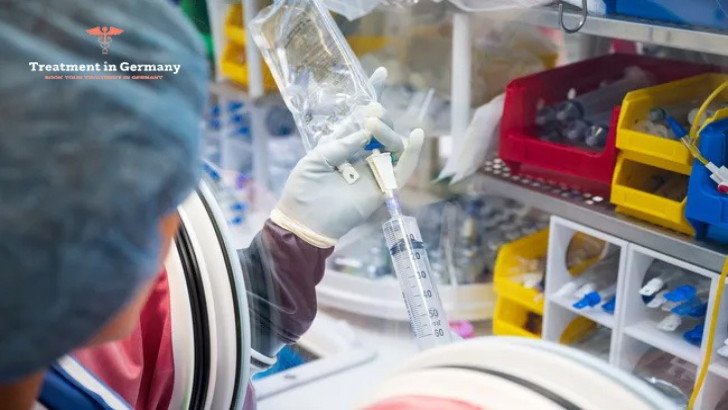
Germany, a leader in innovative cancer treatments, is at the forefront of advancing these therapeutic advancements through cutting-edge clinical trials.
Next-gen dendritic cell (DC) platforms, particularly those utilizing double-loading antigens, are transforming cancer immunotherapy by enhancing immune activation against aggressive malignancies like glioblastoma, melanoma, and prostate cancer. Germany, a leader in innovative cancer treatments, is at the forefront of advancing these therapeutic advancements through cutting-edge clinical trials.
Dendritic cells (DCs) are the immune system’s master regulators, uniquely capable of presenting tumor antigens to T cells to trigger immune activation. Next-gen DC platforms enhance this process by double-loading antigens—combining tumor lysate and mRNA to mimic viral infections, thereby amplifying anti-tumor efficacy. This approach, exemplified by platforms like Diakonos Oncology’s DOC1021, loads antigens onto both MHC Class I and II molecules, stimulating robust CD8+ and CD4+ T cell responses. German oncology centers leverage these platforms in clinical trials, targeting solid tumors and hematologic malignancies to improve survival rates.
Cancer symptoms vary by malignancy but are critical for identifying candidates for next-gen DC platforms. Common symptoms for cancers like glioblastoma, melanoma, and prostate cancer include:
These symptoms signal the need for diagnostic precision. German specialists use advanced diagnostic tools to confirm eligibility for DC-based immunotherapy, ensuring timely intervention.
Precision Diagnostic Precision for DC-Based Immunotherapy
Accurate diagnostic precision is essential to tailor next-gen DC platforms to patient-specific tumor antigens. Germany’s oncology centers employ state-of-the-art diagnostic tools:
German oncologists and immunologists ensure rapid, precise diagnostics, enabling personalized immunotherapy within weeks of diagnosis.
Germany’s Leadership in Next-Gen DC Platforms and Clinical Trials
Germany’s advanced cancer care ecosystem positions it as a global leader in next-gen DC platforms, with double-loading antigens driving therapeutic advancements in clinical trials.
Mechanism of Double-Loading Antigens
Double-loading antigens enhances DC vaccines by combining tumor lysate and mRNA:
German immunologists optimize antigen presentation, ensuring robust anti-tumor efficacy.
Integration with Combination Therapies
Next-gen DC platforms are combined with other treatments to maximize patient outcomes:
This multidisciplinary cancer care, led by German oncologists, amplifies therapeutic advancements.
Clinical Trials: Pioneering Therapeutic Advancements
Germany’s clinical trials advance next-gen DC platforms:
German oncology centers lead these trials, expanding applications for innovative cancer treatments.
Why Germany Excels in Next-Gen DC Platforms
Germany offers unique advantages for cancer patients seeking DC-based immunotherapy:
Risk Factors and Prevention Strategies for Cancer
Preventing cancer recurrence supports DC-based immunotherapy. Risk factors include:
German specialists recommend regular screenings (PSA, MRI), healthy diets, and exercise to reduce disease risk.
Comprehensive Multidisciplinary Cancer Care
Germany’s multidisciplinary cancer care integrates next-gen DC platforms with:
This holistic approach optimizes anti-tumor efficacy and patient outcomes.
Post-Treatment Support and Enhancing Quality of Life
After DC-based immunotherapy, German oncology centers provide comprehensive follow-up:
Germany’s patient-centric approach ensures sustained recovery.
Challenges and Future Horizons
Next-gen DC platforms face challenges, including tumor immunosuppression and antigen selection complexity. German researchers address these through:
Future innovations, such as in vivo DC reprogramming or universal DC vaccines, promise to advance cancer immunotherapy.
Conclusion
Germany’s leadership in next-gen DC platforms, particularly double-loading antigens, is revolutionizing cancer immunotherapy. By leveraging immune activation, clinical trials, and multidisciplinary cancer care, German oncology centers deliver tailored therapeutic advancements for cancer patients with glioblastoma, melanoma, and prostate cancer. Supported by world-class specialists and cutting-edge technology, Germany ensures exceptional survival rates and quality of life. As a global pioneer in precision oncology, Germany offers hope through innovative cancer treatments, blending scientific breakthroughs with compassionate care.
Frequently Asked Questions
What are next-gen DC platforms in cancer immunotherapy?
They are advanced DC vaccines using double-loading antigens to enhance immune activation, offered in German oncology centers.
What cancer symptoms do next-gen DC platforms address?
Symptoms like neurological issues, skin changes, urinary difficulties, and fatigue in various cancers.
How is eligibility for DC-based immunotherapy determined in Germany?
Through tumor sequencing, PSMA PET-CT, MRI, and biopsies for diagnostic precision.
Are clinical trials for next-gen DC platforms available in Germany?
Yes, German oncology centers conduct clinical trials for glioblastoma, melanoma, and prostate cancer.
Is follow-up care provided after DC-based immunotherapy in Germany?
Yes, including monitoring, rehabilitation, and emotional wellness support.
How does Germany compare to the UK/US for DC-based immunotherapy?
Germany excels in therapeutic innovations, rapid access, and holistic care.
Can next-gen DC platforms prevent cancer recurrence?
They induce robust T cell responses to delay recurrence, as shown in clinical trials.
Does Germany support international cancer patients?
Hospitals in Germany offer language assistance, travel coordination, and emotional wellness programs.
What are the latest advancements in next-gen DC platforms in Germany?
AI-driven antigen selection, nanoparticle delivery, and combination therapies.
How do next-gen DC platforms differ from traditional cancer treatments?
Unlike chemotherapy, they use personalized immunotherapy to target tumor antigens for precise immune activation.
For further details, visit our contact us page
Kindly complete the form below, and our dedicated team will reach out to you promptly. We look forward to connecting with you soon!
Trierer Straße, 56072 Koblenz, Germany
.webp)
.webp)
 (1).webp)
 (1).webp)

.webp)
.webp)
 (1).webp)
 (1).webp)
